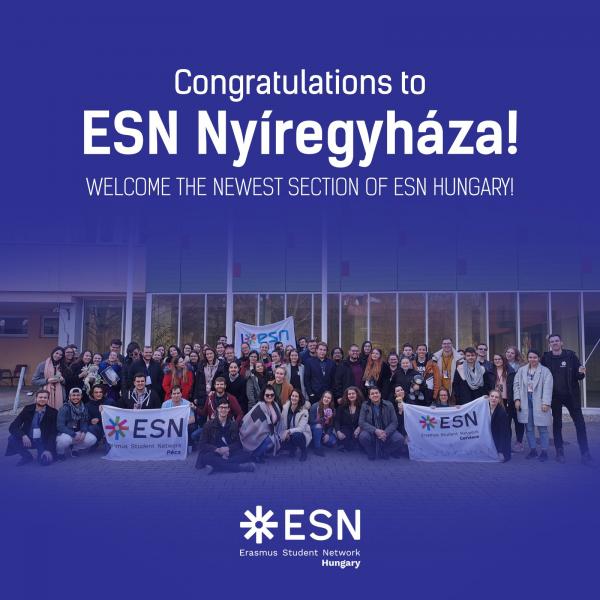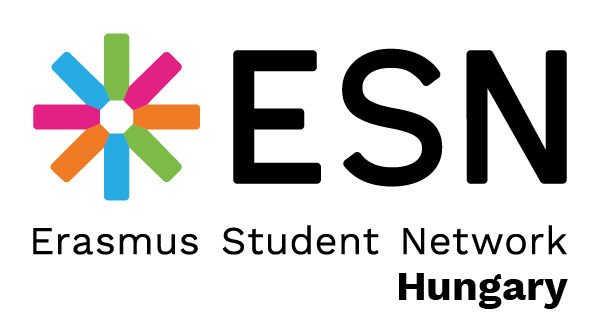
ESN Nyíregyháza
Our family got bigger! To welcome and get to know ESN Nyíregyháza, the newest section of ESN Hungary, a little bit better, our National Partnership Coordinator, Betti Pintér asked some questions to their Section President, Enikő Szakos.
Betti: Since our last National Assembly, ESN Nyíregyháza is a full-fledged member of ESN Hungary, which made us all really happy. It was a pleasure to watch you become a section, to develop and achieve certain goals that made us proud of you. How did your story start, and how did you get in contact with ESN?
Enikő: It is a quite cute story. I was on Erasmus during the spring semester of 2019 in Spain, in Castellón de la Plana, near Valencia, which is a town roughly the size of Nyíregyháza, but their ESN section is really big. While I was there, I decided that when I get home, I’ll form ESN in Nyíregyháza, because I was already in contact with Erasmus students previously, we met them and formed friendships and I felt that doing it in a more organized way would be great. I came home in July, and when I arrived, the International Office of the University of Nyíregyháza, with whom I had a good relationship already, invited me and told me that they have an idea: let’s form an ESN section. We wanted the same without knowing about each other’s intentions. So with a tiny team, we started to work on it, and the International Office helped us a lot. Before ESN, the IRO had mentors, and it is the foundation on which the section was built. We discussed with the mentors that their work does not change, but they have a huge organization to support them. Then we applied, and talked a lot with Matyi about what we should do and how, in order to become a section. When we went to our first National Platform at Pécs in November 2019, we were about 10 in the team. That was where we introduced ourselves and our application got accepted.
B: What are the parts of an application?
E: A lot of paperwork and emails, discussions with the IRO, intense planning, and determining if it is really needed. I never saw a reason why we should not make a section, but the question arose: what if in the future, the circumstances will not be satisfactory, what if there won’t be enough people in the section, what if there won’t be incoming students, what would we do then? But thankfully, it does not seem to be a problem. Since then, there was a period when we were 15 in the team, which is a lot in our terms. Furthermore, the University decided to “internationalize” itself. There are already international students in Nyíregyháza, mostly because of WizzAir’s pilot training programme, and at the Faculty of Medicine of the University of Debrecen, which also has a campus in Nyíregyháza. We share a dormitory with them. So far, ESN Debrecen dealt with them, but we discussed that they are welcome in our events too.
B: Another topic: which mobility programmes do you cover at the University?
E: All of them. Mainly Erasmus and Stipendium Hungaricum: we accepted 40 of them this semester, also we deal with full-time international students. We did not have too many Erasmus students this semester, so we had the capacity to deal with the other incoming students.
B: How active are the incoming students?
E: It varies, but most of them are active. The incoming students form a close community, so if one goes to an event, all of them goes. What I also find important to mention, that despite the smaller university and town, the organizations dealing with international affairs, like Eurodesk, Központ or Mustárház, are holding regular meetings, which I also participate in. Lot of cool things were going on before Covid, we were planning to hold some bigger events together during the summer.
B: So if I get it right, ESN was mainly formed by those who were mentors previously. How did you start to work together?
E: Most of us were on Erasmus, and the IRO reached out to us when we returned. The newcomers were recruited by me.
B: How is the group dynamic?
E: It’s great. We get along really well professionally and personally, and meet a lot outside work too. We had some struggles with the IRO until they treated us as equals. It is hard when there is no person to say the final word and be the leader, so it was beneficial when I officially became the President, which was a unanimous decision. The IRO thought I would be the best fit from the beginning.
B: How many are you in the section now?
E: That’s a good question. We lost members during the holidays, and when everyone was sent home again. We have to re-gather them, and we will have recruitment soon. Also, I should start searching for my successor.
B: How do you share the tasks and responsibilities?
E: We usually distributed the tasks a week before among those who had the capacity. There were no big projects. Most of them were done by me, I also did all the visuals for social media.
B: I’m not competent in the topic, but they look good. Congrats.
E: Yes, I tend to do a lot of things by myself instead of delegating. We try to distribute the tasks, though.
B: Does the present team have the capacity to deal with all the tasks?
E: It depends. There are periods when we are really active and performing well, but there were those periods when all the students arrived at different times, had to self-isolate and we had to go shopping for them and take care of them, so we barely had time for anything else. The mid-term period was tough too, so we realized we need more members, but it’s not easy to activize the students.
B: What will the recruitment look like? How do you plan to reach the students?
E: We plan to reach them mainly via Facebook. I was planning to go to classes and speak about ESN in the beginning, and we planned to go to the Freshmens’ Camp, because catching the interest of the first-year students is the easiest. We are closely cooperating with the Student Union, and we are going to send a Neptun message too. We have regular meetings with the IRO, and they proved to be really helpful.
B: If you manage to recruit more people, do you plan to establish and define positions?
E: Yes. For this recruitment, I plan to do a task-breakdown, and new members will be able to indicate their interest. We plan to form working groups, and we will see how this evolves into concrete positions. This is all very new for the students, and it seems less scary to be a part of a working group than applying for a position.
B: There is this project I really liked, the Erasmus room, could you tell me a little bit about it?
E: Yes, there will be an Erasmus room, funded by the University. We will get a big room in the main building, equipped for us, so that we can hold events there, and the incoming students can go there to study or chill.
B: To what extent the students of the University know about the organization?
E: Not really yet, but for example the Institute of Music knows us well, because we invited them to some of our events - yet the students barely know about ESN. I think it will take 2-3 years to build up the whole structure and get the students to know us.
B: It is indeed hard work, but the NO is here to support you. How much help did you get from the NB?
E: We got enough help. First it was Matyi, as NR, who always told us what we should do, what forms to fill, what presentations to give. We really needed it, and it was great to have him, and now Anna supports us. Also, the community, and the support and love we got from them was motivational. It sounds a little bit cliché, but it’s true, and this support meant a lot for me. Even the critiques proved to be useful.
B: It is, along with the skills we can get, the best part of ESN in my opinion.
E: Yes, and also, I’m really looking forward to inviting you to Nyíregyháza.
B: We are all really glad to have you in our ESN family. Starting to build up something from scratch is really hard, and I think it’s safe to say we all respect your efforts and are happy for your achievements. Thank you for the conversation!


Follow us